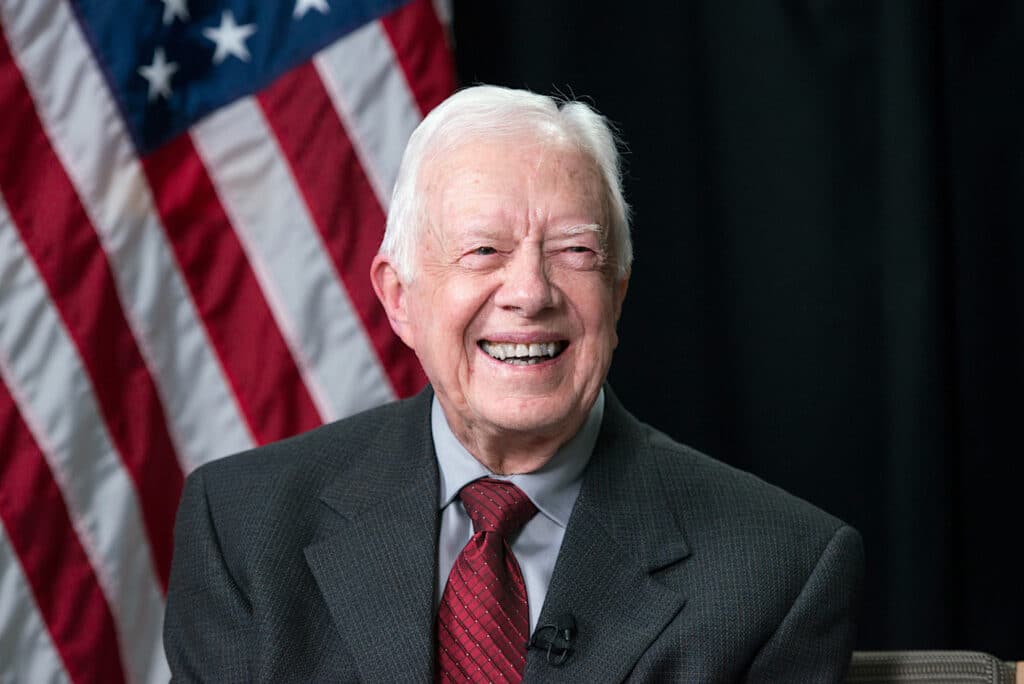
“There’s our Jimmy,” said an excited Southern woman at a rest stop heading to Plains, Georgia, from Atlanta.
I thought it was odd to think of former US President Jimmy Carter as ours. No one should be possessed by another. Yet, the phrase stuck with me through the past four years. This woman and I were part of a group involved with the Carter Center as donors or volunteers, and we were heading for a weekend in Plains with Jimmy and Rosalynn Carter (and other Carter family members and a few US Secret Service agents).
I do not remember his presidency, but I remember my Texan family’s resentment towards him. And the jokes at his expense, especially the ones about peanuts. But what I know after being more aware of the Carter Center is his commitment to global health and peace that transformed millions of lives worldwide. And he and Rosalynn have touched my heart and helped me find my due North.
A profoundly religious man, President Jimmy Carter’s preaching was through practice by improving human life. The Carter Center has accomplished so much due to its laser focus on peace and health. His brief four-year presidency offered the springboard to provide a better life for millions. [see below: A lifetime of impacts.]
One of the Center’s initiatives helped reduce the number of Guinea worm cases from about 3.5 million in 1986 to just 13 in 2022. Guinea worm is a parasite that causes debilitating effects when it infects a person, grows within the abdomen then emerges from the skin. Preventing the suffering of millions started with the combination of sharp focus and achievable goals – in this case neglected tropical diseases (NTDs). [see below: Guinea worm not infecting millions thanks to the Carter Center.]
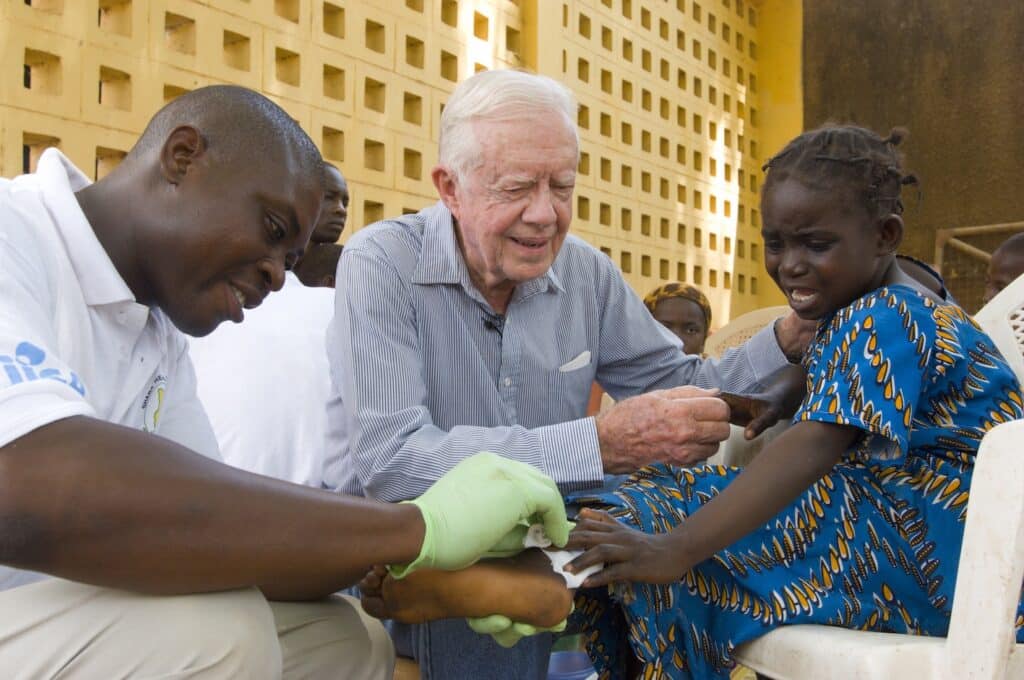
Other crucial factors for success have been to build trust with communities and find sustainable solutions. The Center’s staff and volunteers hail from across the globe, but most significantly, from the countries affected by the NTDs. And solutions through community engagement have made filtering available water sources common and kept people and animals with emerging worms away from open bodies of water. [see below: Carter Center research exemplifies global collaborations.]
Drawn to the Carter Center for its dedication to eliminating disease, I came to respect its work, its people, and its volunteers. And to continuously be amazed by President Jimmy Carter.
One fond memory is of a smiling Jimmy Carter speaking in 2018 at the ‘Weekend at the Carter Center’. At some point, he asked the audience of a few hundred people sitting in the Atlanta auditorium: When were (US) women given the right to vote? The audience members willing to speak would fumble around the 1920s for the date. Carter, not smiling, would respond with a resounding ‘NO.’ Quiet from the audience. “1965”, he belted, “with the Voting Rights Act – when all women had the right to vote.” We learned the lesson.
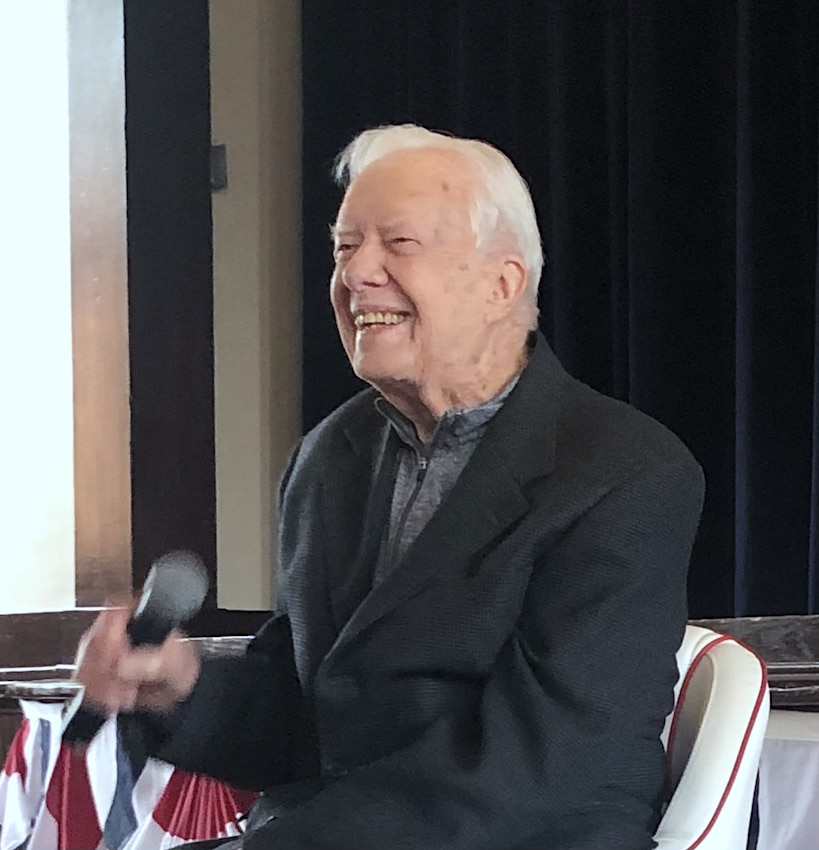
Maybe he lacked the charisma to woo enough US voters to secure a second presidential term. Yet the single-term presidency opened doors to opportunities for positive change. He leveraged the gift selflessly, serving the world population his entire life – tirelessly working for all people, even the ones who did not like or respect him. His contribution to us was to build something that could outlast him. “Waging peace. Fighting disease. Building hope.”
Many articles on President Carter will illuminate his life in the coming weeks and months. But monumental events offer a time to pause and reflect. So I have seized the moment to celebrate an admirable life.
If contemporary writing is the first draft of history, here is a small contribution.
Because this history is his, mine, and ours. Our Jimmy.
A lifetime of impacts
Leslie McIntosh, Liz Smee, Anthony Dona, Shane Jackson, Briony Fane
President Carter leveraged his one term as the ‘most powerful person in the world’ as the US President to have a lifetime of impacts. This is one glimpse into those from the perspective of publications by at least one author at the Carter Center.
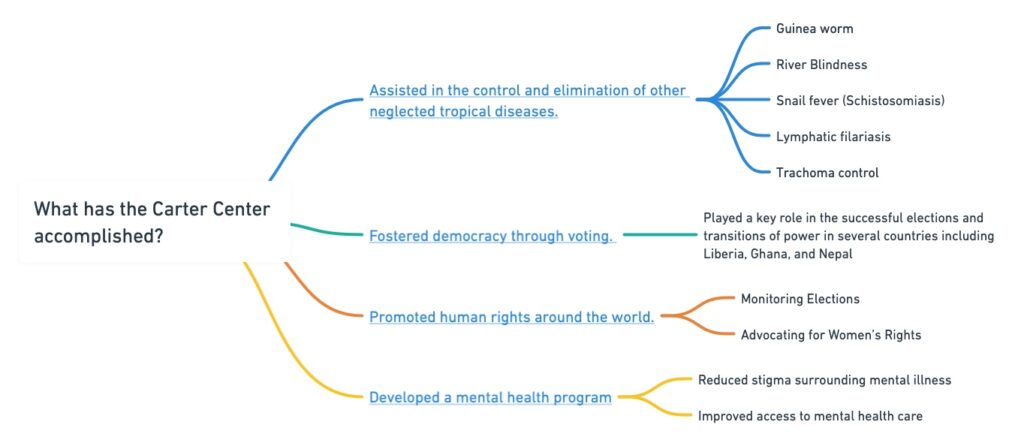
1. Assisted in the control and elimination of other neglected tropical diseases.
2. Fostered democracy through voting.
3. Promoted human rights around the world.
4. Developed a mental health program.
Carter Center research exemplifies global collaborations
Since 1988, researchers from the Carter Center have accumulated over 450 research publications. The Carter Center developed an international collaborative network finding solutions with people and countries. Unsurprisingly, over 70% of these publications include researchers across a number of different countries. While we would expect most of the publications to hail from the United States, the Center’s deep commitment to working within local communities across the globe is reflected in their collaboration network including Ethiopia, UK, and Nigeria.
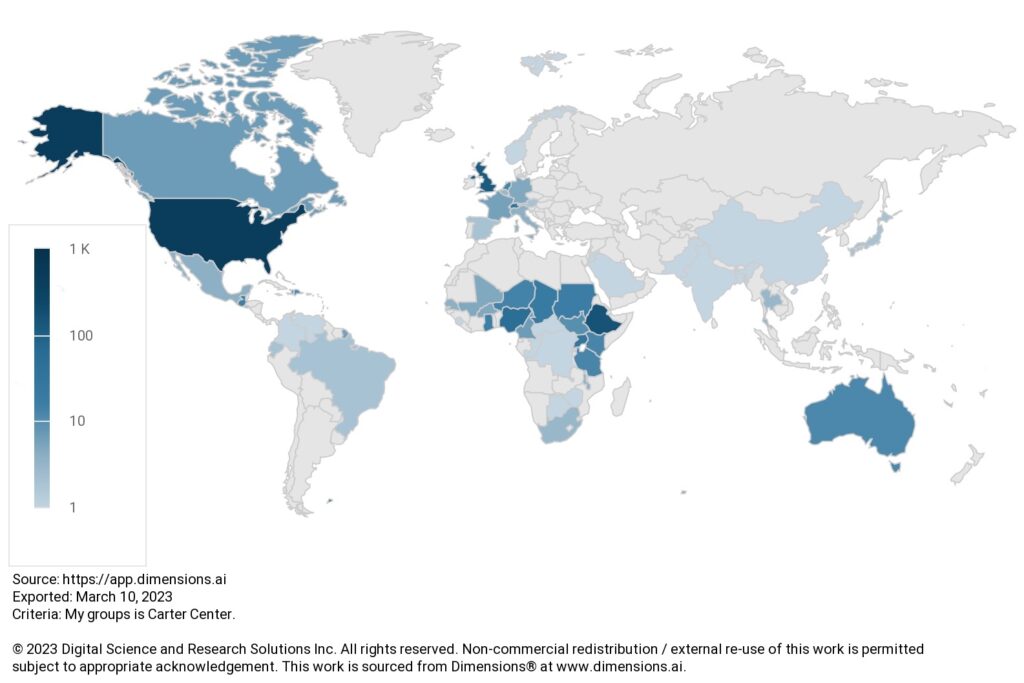
Carter Center publications and citations by the UN Sustainable Development Goals (SDGs)
| Sustainable Development Goal (SDG) | Publications | Citations | |
| 1 | No Poverty | 2 | 80 |
| 2 | Zero Hunger | 1 | 36 |
| 3 | Good Health and Well-being | 379 | 8,518 |
| 4 | Quality Education | 2 | 32 |
| 5 | Gender Equality | 1 | 8 |
| 6 | Clean Water and Sanitation | 25 | 663 |
| 8 | Decent Work and Economic Growth | 1 | 3 |
| 10 | Reduced Inequalities | 1 | 52 |
| 11 | Sustainable Cities and Communities | 1 | 12 |
| 14 | Life Below Water | 2 | 16 |
| 16 | Peace, Justice and Strong Institutions | 10 | 187 |
The United Nations adopted 17 Sustainable Development Goals to provide “a shared blueprint for peace and prosperity for people and the planet, now and into the future”. Given the focus of the Carter Center, it is unsurprising to find the vast majority of their publications associated with SDGs. The table above reveals that out of a total of 468 research outputs published by Carter Center researchers from 1986-2022, 425 (91%) are associated with 11 of the SDGs, most notably SDG3 – Good Health and Well-being.
Guinea worm not infecting millions thanks to the Carter Center
The World Health Organization (WHO) recognised the need to focus on Guinea worm disease (dracunculiasis) in 1981. The Carter Center partnered with the WHO and other organisations since 1986 working to eradicate Guinea worm. At first, it appears there are a growing number of cases, however, this is due to counting. Setting an audacious goal of eradicating a disease starts with determining who and how many are affected. By 2021, only 15 cases were counted. Read more at the WHO or Carter Center on Guinea worm eradication.
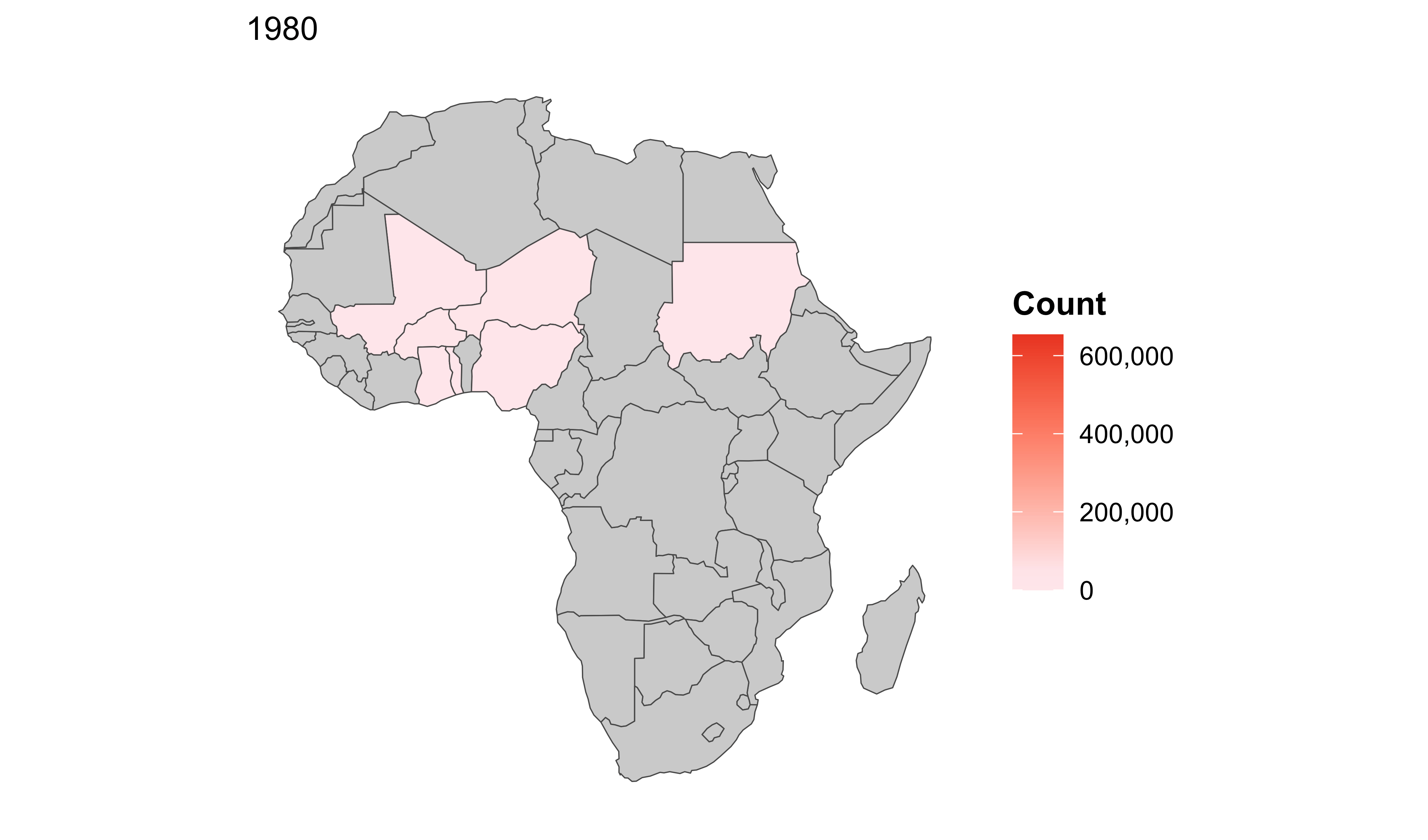
Carter Center publications influence policies
From their relatively small number of publications, the Carter Center punches above its weight, with 131 publications being cited in 149 publically available policies. The majority of the policies focus on tropical diseases and inform WHO guidelines from the overall topic of neglected tropical diseases to a subset within NTDs, such as treating onchocerciasis. Given the co-focus on peace initiatives, publications surrounding elections and governing also influenced policies, such as with the 2012 Ghana election. The Center’s holistic focus to build hope through communities also comes through in policies fostering community engagement. The Carter Center goals transported ideas to work with outcomes communicated through scholarly publications then into policies. ‘Waging peace. Fighting disease. Building hope.‘ has never been just a tagline.
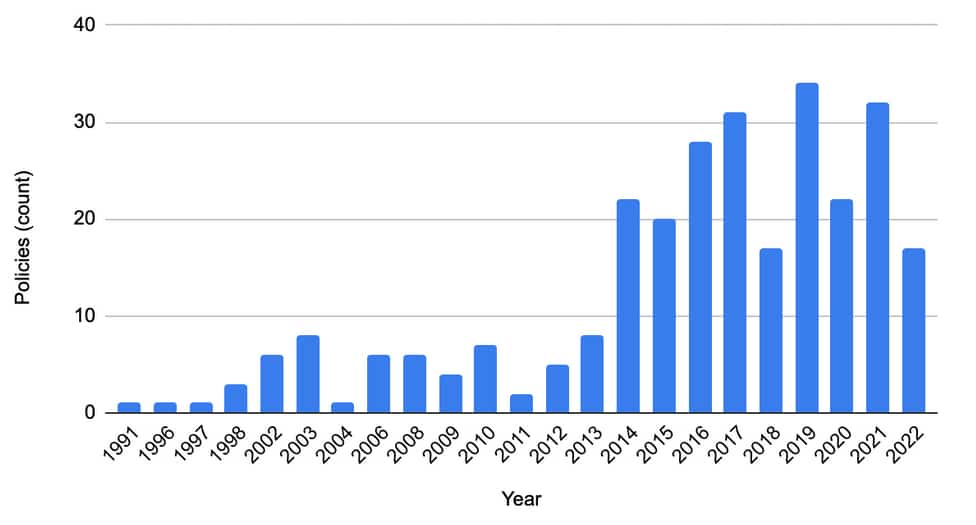
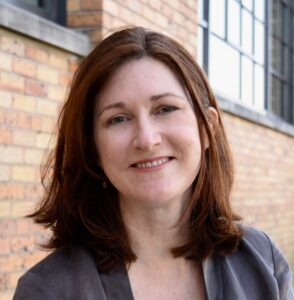
About the Author
Dr Leslie McIntosh, Vice President, Research Integrity | Digital Science
Dr McIntosh is founder and CEO of Ripeta, a company formed to improve scientific research quality and reproducibility. Part of Digital Science, Ripeta leads efforts in automating quality checks of research manuscripts. Academic turned entrepreneur, Dr McIntosh served as the executive director for the Research Data Alliance (RDA) – US region and as the Director of the Center for Biomedical Informatics at Washington University School in St. Louis. Over the past years, she has dedicated her work to improving science. She has been a member of the Carter Center since 2008.
Acknowledgements
Thanks to the work from Digital Science experts on Dimensions data (Liz Smee, Anthony Dona, Simon Porter), data visualization (Shane Jackson), and the UN Sustainable Development Goals (Briony Fane).
The post Our Jimmy – Thank you for your service appeared first on Digital Science.
from Digital Science https://ift.tt/hZ8Kbfi


No comments:
Post a Comment